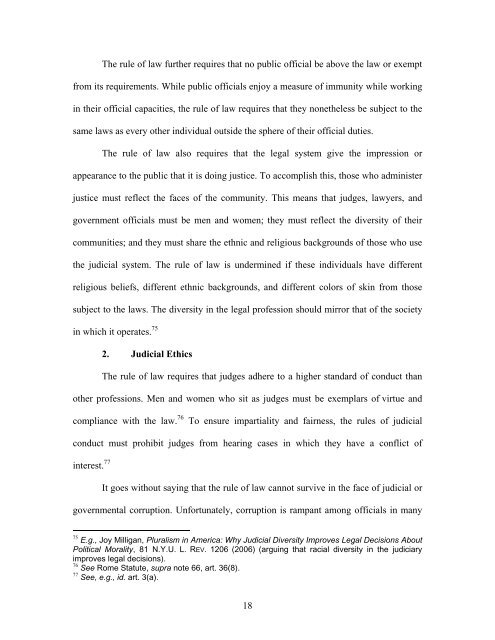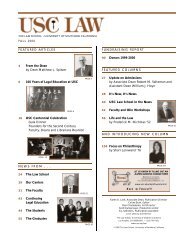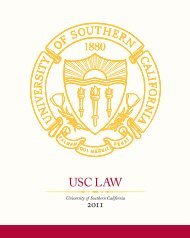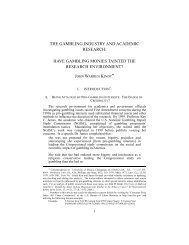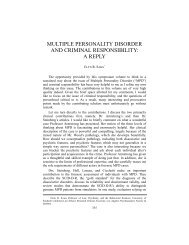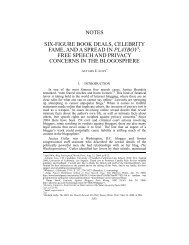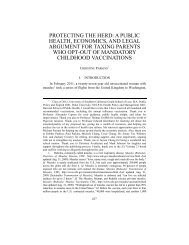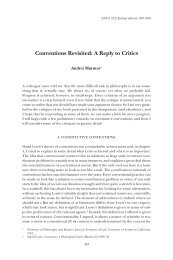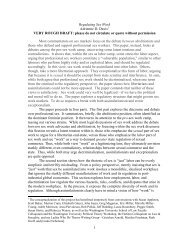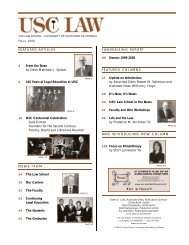Bufford Defining the Rule of Law
Bufford Defining the Rule of Law
Bufford Defining the Rule of Law
Create successful ePaper yourself
Turn your PDF publications into a flip-book with our unique Google optimized e-Paper software.
The rule <strong>of</strong> law fur<strong>the</strong>r requires that no public <strong>of</strong>ficial be above <strong>the</strong> law or exempt<br />
from its requirements. While public <strong>of</strong>ficials enjoy a measure <strong>of</strong> immunity while working<br />
in <strong>the</strong>ir <strong>of</strong>ficial capacities, <strong>the</strong> rule <strong>of</strong> law requires that <strong>the</strong>y none<strong>the</strong>less be subject to <strong>the</strong><br />
same laws as every o<strong>the</strong>r individual outside <strong>the</strong> sphere <strong>of</strong> <strong>the</strong>ir <strong>of</strong>ficial duties.<br />
The rule <strong>of</strong> law also requires that <strong>the</strong> legal system give <strong>the</strong> impression or<br />
appearance to <strong>the</strong> public that it is doing justice. To accomplish this, those who administer<br />
justice must reflect <strong>the</strong> faces <strong>of</strong> <strong>the</strong> community. This means that judges, lawyers, and<br />
government <strong>of</strong>ficials must be men and women; <strong>the</strong>y must reflect <strong>the</strong> diversity <strong>of</strong> <strong>the</strong>ir<br />
communities; and <strong>the</strong>y must share <strong>the</strong> ethnic and religious backgrounds <strong>of</strong> those who use<br />
<strong>the</strong> judicial system. The rule <strong>of</strong> law is undermined if <strong>the</strong>se individuals have different<br />
religious beliefs, different ethnic backgrounds, and different colors <strong>of</strong> skin from those<br />
subject to <strong>the</strong> laws. The diversity in <strong>the</strong> legal pr<strong>of</strong>ession should mirror that <strong>of</strong> <strong>the</strong> society<br />
in which it operates. 75<br />
2. Judicial Ethics<br />
The rule <strong>of</strong> law requires that judges adhere to a higher standard <strong>of</strong> conduct than<br />
o<strong>the</strong>r pr<strong>of</strong>essions. Men and women who sit as judges must be exemplars <strong>of</strong> virtue and<br />
compliance with <strong>the</strong> law. 76 To ensure impartiality and fairness, <strong>the</strong> rules <strong>of</strong> judicial<br />
conduct must prohibit judges from hearing cases in which <strong>the</strong>y have a conflict <strong>of</strong><br />
interest. 77<br />
It goes without saying that <strong>the</strong> rule <strong>of</strong> law cannot survive in <strong>the</strong> face <strong>of</strong> judicial or<br />
governmental corruption. Unfortunately, corruption is rampant among <strong>of</strong>ficials in many<br />
75 E.g., Joy Milligan, Pluralism in America: Why Judicial Diversity Improves Legal Decisions About<br />
Political Morality, 81 N.Y.U. L. REV. 1206 (2006) (arguing that racial diversity in <strong>the</strong> judiciary<br />
improves legal decisions).<br />
76 See Rome Statute, supra note 66, art. 36(8).<br />
77 See, e.g., id. art. 3(a).<br />
18


